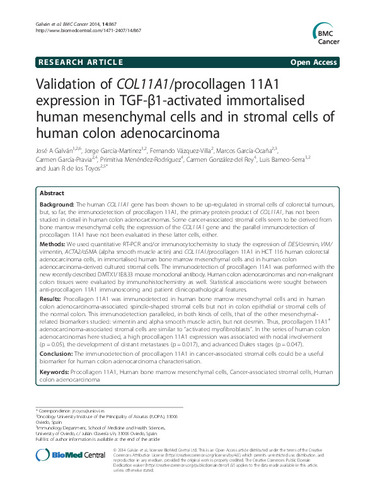Validation of COL11A1/procollagen 11A1 expression in TGF-β1-activated immortalised human mesenchymal cells and in stromal cells of human colon adenocarcinoma
Palabra(s) clave:
Cáncer
Colon
Fecha de publicación:
Editorial:
BioMed Central
Versión del editor:
Citación:
Resumen:
Background: The human COL11A1 gene has been shown to be up-regulated in stromal cells of colorectal tumours, but, so far, the immunodetection of procollagen 11A1, the primary protein product of COL11A1, has not been studied in detail in human colon adenocarcinomas. Some cancer-associated stromal cells seem to be derived from bone marrow mesenchymal cells; the expression of the COL11A1 gene and the parallel immunodetection of procollagen 11A1 have not been evaluated in these latter cells, either. Methods: We used quantitative RT-PCR and/or immunocytochemistry to study the expression of DES/desmin, VIM/vimentin, ACTA2/αSMA (alpha smooth muscle actin) and COL11A1/procollagen 11A1 in HCT 116 human colorectal adenocarcinoma cells, in immortalised human bone marrow mesenchymal cells and in human colon adenocarcinoma-derived cultured stromal cells. The immunodetection of procollagen 11A1 was performed with the new recently described DMTX1/1E8.33 mouse monoclonal antibody. Human colon adenocarcinomas and non-malignant colon tissues were evaluated by immunohistochemistry as well. Statistical associations were sought between anti-procollagen 11A1 immunoscoring and patient clinicopathological features. Results: Procollagen 11A1 was immunodetected in human bone marrow mesenchymal cells and in human colon adenocarcinoma-associated spindle-shaped stromal cells but not in colon epithelial or stromal cells of the normal colon. This immunodetection paralleled, in both kinds of cells, that of the other mesenchymalrelated biomarkers studied: vimentin and alpha smooth muscle actin, but not desmin. Thus, procollagen 11A1+ adenocarcinoma-associated stromal cells are similar to “activated myofibroblasts”. In the series of human colon adenocarcinomas here studied, a high procollagen 11A1 expression was associated with nodal involvement (p = 0.05), the development of distant metastases (p = 0.017), and advanced Dukes stages (p = 0.047). Conclusion: The immunodetection of procollagen 11A1 in cancer-associated stromal cells could be a useful biomarker for human colon adenocarcinoma characterisation. Keywords: Procollagen 11A1, Human bone marrow mesenchymal cells, Cancer-associated stromal cells, Human colon adenocarcinoma
Background: The human COL11A1 gene has been shown to be up-regulated in stromal cells of colorectal tumours, but, so far, the immunodetection of procollagen 11A1, the primary protein product of COL11A1, has not been studied in detail in human colon adenocarcinomas. Some cancer-associated stromal cells seem to be derived from bone marrow mesenchymal cells; the expression of the COL11A1 gene and the parallel immunodetection of procollagen 11A1 have not been evaluated in these latter cells, either. Methods: We used quantitative RT-PCR and/or immunocytochemistry to study the expression of DES/desmin, VIM/vimentin, ACTA2/αSMA (alpha smooth muscle actin) and COL11A1/procollagen 11A1 in HCT 116 human colorectal adenocarcinoma cells, in immortalised human bone marrow mesenchymal cells and in human colon adenocarcinoma-derived cultured stromal cells. The immunodetection of procollagen 11A1 was performed with the new recently described DMTX1/1E8.33 mouse monoclonal antibody. Human colon adenocarcinomas and non-malignant colon tissues were evaluated by immunohistochemistry as well. Statistical associations were sought between anti-procollagen 11A1 immunoscoring and patient clinicopathological features. Results: Procollagen 11A1 was immunodetected in human bone marrow mesenchymal cells and in human colon adenocarcinoma-associated spindle-shaped stromal cells but not in colon epithelial or stromal cells of the normal colon. This immunodetection paralleled, in both kinds of cells, that of the other mesenchymalrelated biomarkers studied: vimentin and alpha smooth muscle actin, but not desmin. Thus, procollagen 11A1+ adenocarcinoma-associated stromal cells are similar to “activated myofibroblasts”. In the series of human colon adenocarcinomas here studied, a high procollagen 11A1 expression was associated with nodal involvement (p = 0.05), the development of distant metastases (p = 0.017), and advanced Dukes stages (p = 0.047). Conclusion: The immunodetection of procollagen 11A1 in cancer-associated stromal cells could be a useful biomarker for human colon adenocarcinoma characterisation. Keywords: Procollagen 11A1, Human bone marrow mesenchymal cells, Cancer-associated stromal cells, Human colon adenocarcinoma
Descripción:
Our observations stress once more the usefulness of the DMTX1/1E8.33 mAb for cancer research, and the clinical significance of procollagen 11A1 as a very valuable biomarker to characterise cancer-associated stromal cells and to evaluate human colon adenocarcinomas.
ISSN:
Patrocinado por:
This research has been co-financed by European Union ERDF Funds; by the INNPACTO-ONCOPAN IPT-010000-2010-31 Project; by the FISS-09-PS09/01911 Project, Ministry of Science and Innovation, Spain; by the FC-11-PC10-23, FICYT Project, Axe 1 of the 2007–2013 ERDF Operational Framework Programme of the Principality of Asturias, Spain; and by Oncomatrix, S.L. Derio, Spain.
Colecciones
- Artículos [37532]
- Biología Funcional [801]
- Investigaciones y Documentos OpenAIRE [8365]
Ficheros en el ítem





